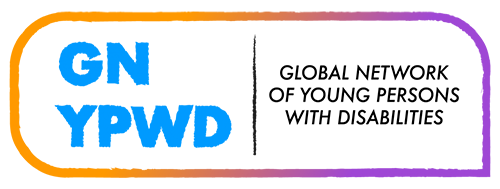About GNYPWD
Young persons with disabilities belong to one of the most marginalized segments of society. Often, we are discriminated against based on our lack of experience, age, disability, gender, and sexual orientation. Barriers to active participation and fulfillment of human rights of young persons with disabilities include issues such as lack of representation and meaningful participation, lack of access to technology, and lack of access to basic human rights such as education, employment, bodily autonomy, and sexual and reproductive rights. Disability advocacy is moot as long as the leadership of young persons with disabilities is missing and we remain invisible and dispersed within the larger disability advocacy space. We experience limited leadership and decision-making opportunities with decisions made for us by gatekeepers who do not truly understand our needs. Too often, international agendas focus on “architectural” accessibility where they fail to tackle matters of disability as a 360 aspect of great intersectionality, diversities and the ground realities.
In an effort to bridge these gaps, the Global Network of Young Persons with Disabilities (GNYPWD) was founded in the aftermath of the UN’s 2020 Conference of the States Parties (COSP) to the Convention on the Rights of Persons with Disabilities (CRPD), aiming to offer an advocacy space that ensures the inclusive participation and leadership of young persons with disabilities in the youth and disability rights agendas within the UN system and beyond. With over 500 members from 80+ countries, we are a fast-growing community and network.
Today, GNYPWD, through our technology and community initiatives, brings together, cross-fertilize, and bolster constituencies and networks of youth with disabilities interested in working on the interlinkages between youth, disability, gender, leadership, and meaningful participation to ensure that decision-makers look at all youth relevant agendas with a disability inclusive lens through concerted advocacy efforts led by young leaders with disabilities who have a holistic knowledge of the above mentioned intersectionality. We furthermore provide a network to empower people with disabilities to hold leadership positions at the local, national and international levels. This is accomplished by identifying young persons with disabilities around the world, collaborating with UN actors, and utilizing UN resources and networks to support these young persons with disabilities to conceive, manage, and lead projects, while sharing their learnings with the rest of the network. In the end, this helps create a more interconnected, well-informed, and powerful network of young people with disabilities – a constituency that has otherwise been underrepresented at disability rights conventions and whose work remains fragmented. This also helps inform the UN and other partners of the aspirations of and challenges faced by this crucial and overlooked population.
In an effort to bridge these gaps, the Global Network of Young Persons with Disabilities (GNYPWD) was founded in the aftermath of the UN’s 2020 Conference of the States Parties (COSP) to the Convention on the Rights of Persons with Disabilities (CRPD), aiming to offer an advocacy space that ensures the inclusive participation and leadership of young persons with disabilities in the youth and disability rights agendas within the UN system and beyond. With over 500 members from 80+ countries, we are a fast-growing community and network.
Today, GNYPWD, through our technology and community initiatives, brings together, cross-fertilize, and bolster constituencies and networks of youth with disabilities interested in working on the interlinkages between youth, disability, gender, leadership, and meaningful participation to ensure that decision-makers look at all youth relevant agendas with a disability inclusive lens through concerted advocacy efforts led by young leaders with disabilities who have a holistic knowledge of the above mentioned intersectionality. We furthermore provide a network to empower people with disabilities to hold leadership positions at the local, national and international levels. This is accomplished by identifying young persons with disabilities around the world, collaborating with UN actors, and utilizing UN resources and networks to support these young persons with disabilities to conceive, manage, and lead projects, while sharing their learnings with the rest of the network. In the end, this helps create a more interconnected, well-informed, and powerful network of young people with disabilities – a constituency that has otherwise been underrepresented at disability rights conventions and whose work remains fragmented. This also helps inform the UN and other partners of the aspirations of and challenges faced by this crucial and overlooked population.
